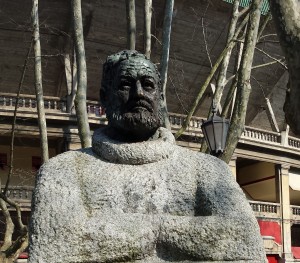 Ernest Hemingway is often misquoted as having said “write drunk, edit sober.” However, as he took his craft very seriously, he would have dismissed this practice as an affront to his process. If he did take up pen while inebriated, it was usually for the purpose of letter writing. He composed his stories in the mornings, standing up with his typewriter on top of a chest of drawers, ready to start where he’d left off the previous day. His advice was to stop writing while you still knew where the story was heading so you had somewhere to begin the next day.
Ernest Hemingway is often misquoted as having said “write drunk, edit sober.” However, as he took his craft very seriously, he would have dismissed this practice as an affront to his process. If he did take up pen while inebriated, it was usually for the purpose of letter writing. He composed his stories in the mornings, standing up with his typewriter on top of a chest of drawers, ready to start where he’d left off the previous day. His advice was to stop writing while you still knew where the story was heading so you had somewhere to begin the next day.
I tried the whole standing-while-writing thing for a little while—it’s not too shabby. I liked being able to move about and think on my feet (quite literally). The most notable difference I found between sitting and standing was my level of alertness at the keyboard. No longer did I sit for minutes (sometimes ten or fifteen at a time), staring at that stupid, blinking cursor, in some kind of inescapable torpor. Instead, I was forced to confront my own incapability of producing a sentence. The cursor glared at me now, every time it blinked it seemed to say “write. write. write. write.”
Forget Hemingway, he never had to deal with taunting technology.
The best piece of writing advice I ever received was hardly suggestion. It wasn’t some aphorism regarding technique, cliché concerning creativity, or maxim that provided inspiration. I suppose at most it was an attitude adjustment. Somebody sat down and told me “you are a writer.”
Due to some errors of my own and the bureaucracy of my college, I found myself with an extra year of studies in which I needed to complete a minor: writing. I had spent much of my college career avoiding this task, opting for reading, discussing, presenting, performing, anything to get me out of writing papers. But I had a few friends who had taken classes in something called Creative Nonfiction. I had written poetry through much of my youth and frequently found myself regaling groups of people with tales from my own and borrowed experience.
I began writing down my own true stories and became very excited by the experience, so much so that after only a month of Creative Nonfiction classes, I decided to apply to graduate school for my Masters of Fine Arts. I commenced telling people “I’m gonna go to grad school to be a writer.”
While I began to prepare my portfolio, I became discouraged. Was this good enough? Was any of it? Why is my writing significant? It wasn’t until one of my professors sat me down and said, “You need to stop thinking that you’re going to be a writer and start thinking of yourself as a writer.” It seems trivial, that I had only considered myself as someone who writes and not a writer, but the distinction made a world of difference. This attitude change allowed me to write with a purpose other than to complete an assignment or as a form of expression; instead, I write because it’s part of my identity. I stopped comparing myself to people whom I esteemed as “authors” and began perceiving all text as writing, the forger, the writer.
This piece of advice allowed me to have confidence in my writing that hadn’t been there before. I found myself taking chances on the page, breaking rules, because writers are allowed such affordances. Previously, I thought this advantage was only available to writers, not to me, the lowly person who merely writes.
In his nonfiction work, A Moveable Feast Hemingway wrote, “I would stand and look out over the roofs of Paris and think, ‘Do not worry. You have always written before and you will write now. All you have to do is write one true sentence. Write the truest sentence that you know.’” Here it is, the truest sentence that I know: I am a writer.
Evan Tingey, Assistant Editor
